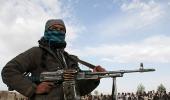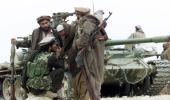The intra-Afghan peace talks, involving representatives from the Afghan government, the Taliban and various other groups, will be held in Norway's capital Oslo by March 10, officials here said on Saturday, as the United States signed a landmark agreement with the Taliban in Doha to bring peace in the war-torn country.

This will be probably for the first time since the 9/11 attacks that the representative of a duly elected Afghan government and the Taliban would be meeting face-to-face for peace talks.
"The parties will be meeting in Oslo. That negotiation will kick off as soon as each of the various components of that can get their negotiators to Oslo. We certainly expect it to be in the first half of March.
"It may take a week, a week and a half, for all the parties to travel there," a senior administration official told reporters in Washington, DC.
Throughout this period, the reduction in violence remains in place, so it will give the US a good opportunity to test the durability of the reduction in violence and also perhaps set a better stage for it to move towards a permanent ceasefire once all the parties are at the table, said the official, who spoke on the condition of anonymity.
"The parties at the table will be the Afghan government and the Opposition; it will be the Taliban; it will be Afghan civil society, and especially women's groups will all be parties for this negotiation at the table.
"The United States will be present, but this will be an intra-Afghan negotiation," said the official.
As part of the agreement, the US has established a communications channel, which is currently based in Doha, where it will continue its role of mediating between the Taliban and the Afghan government.
That communications channel is responsible for supporting the implementation of the agreement, another senior administration official said.
"Obviously, we would be present in intra-Afghan negotiations," the official said, adding that in Oslo, several other countries have expressed their intention to play a helpful role.
"There'll be other governments who will be supporting and facilitating the talks, so it would be, for example, us, the United States; Indonesia is likely to play a role, Germany is likely to play a role, Uzbekistan is interested in playing a role.
"So different types of partners that can help the parties," the second official said.
The United Nations would also be playing a role.
"So they're working out the design of how to do that most effectively, so I think that I would come back to you on how that develops," said the official.
According to the official, upon reaching Oslo, there will be commitments that the parties will be making that will further reduce the level of violence.
"Our aspiration is very early on, once we have all the parties at the table, to reach a real ceasefire, which will require a lot more effort and will require all voices in Afghanistan to be represented at the table, because everyone will need to be committed to that for it to hold," said the official.
Responding to a question, the official said that it is 'genuinely hard to predict' how this is going to unfold, given the complexity of the situation and the various positions of the parties.
"Ideally, what would happen is that they would come to an early conclusion on an approach," the official noted.
They need to identify the many difficult types of issues. For example, security forces, how do they begin consolidation; reconciliation, how do they do that; sort of what their governance structure should be, the official said.
"They don't have to actually agree to all those things, but they have to identify what are the things they have to tackle to set up a political roadmap for the country, and maybe put some timeline against it.
"So that would be an initial agreement, and then they would subsequently execute," the official said.
"What we want to see is progress by all parties. So the non-Talib Afghans as well the Taliban to seriously start working this out. And again, our expectation is that it won't be easy, but possibly they can move more quickly on just identifying selecting the universe of tasks that they have to tackle," the official observed.
More than 18-year-long Afghan war has killed tens of thousands of civilians and Afghanistan remains one of the poorest countries in the world.
Some 2.5 million Afghans are registered as refugees abroad and another two million are displaced within their country.
The war has cost the US taxpayer more than $1 trillion in military and rebuilding costs since the US-led invasion of 2001.
More than 100,000 Afghan civilians have been killed or injured over the past decade, according to the United Nations.











 © 2025
© 2025